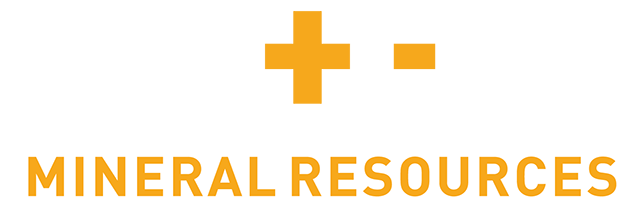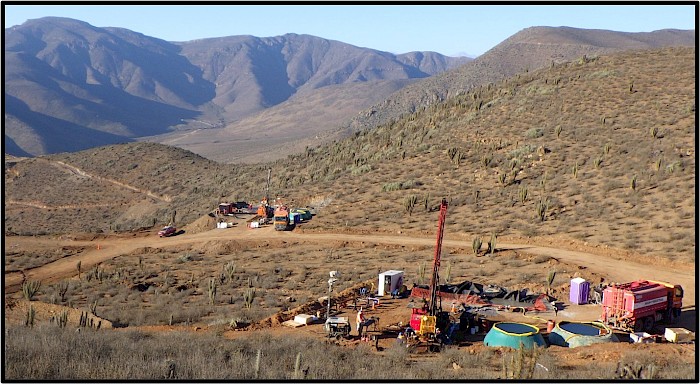NOT FOR DISTRIBUTION TO UNITED STATES NEWS WIRE SERVICES OR FOR RELEASE, PUBLICATION, DISTRIBUTION OR DISSEMINATION DIRECTLY, OR INDIRECTLY, IN WHOLE OR IN PART, IN OR INTO THE UNITED STATES
Vancouver, British Columbia – (July 26th, 2021) – Battery Mineral Resources Corp. (TSXV: BMR) ("Battery" or “BMR” or the "Company") is pleased to announce it has commenced the first phase of exploration and resource infill drilling at the recently producing Punitaqui mine complex (“Punitaqui”) in Chile.
Highlights
- The 31 hole, 6,000 meter (“m”) resource infill and extensional drilling program will focus on the San Andres zone.
- San Andres has established underground ramp access.
- San Andres is the “normal” fault displaced upper portion of the adjacent Cinabrio copper deposit that was operated for 8 years by Glencore and recently mined by Xiana Mining.
- The San Andres drill program is designed to infill previous drilling and extend the resource definition drilling to the north and the south.
- The first diamond core drill commenced second week of July.
- Currently two drills are mobilized to site and drilling, third arriving in August.
- At San Andres, historic wide-spaced drilling, completed by the previous operators between 2011- 2017, totaled 58 holes for 5,927m. Significant intercepts reported included:
- SAS-20-07: 180m to 196m: 15.9m true width at 2.52% Cu;
- SA-50: 128m to 139m: 7.8m true width at 2.39% Cu;
- SAS-20-01: 186m to 197m: 10.1m true width at 2.16% Cu;
- SAS-20-08: 183m to 200m: 15.2m true width at 1.74% Cu.
- The San Andres target is the first of several historic zones identified by BMR with established underground access for infill and extensional drilling.
San Andres Drill Program
San Andres is a zone of copper mineralization located 500m southwest of the high grade Cinabrio Deposit mined by Glencore and Xiana Mining (Figure 1).
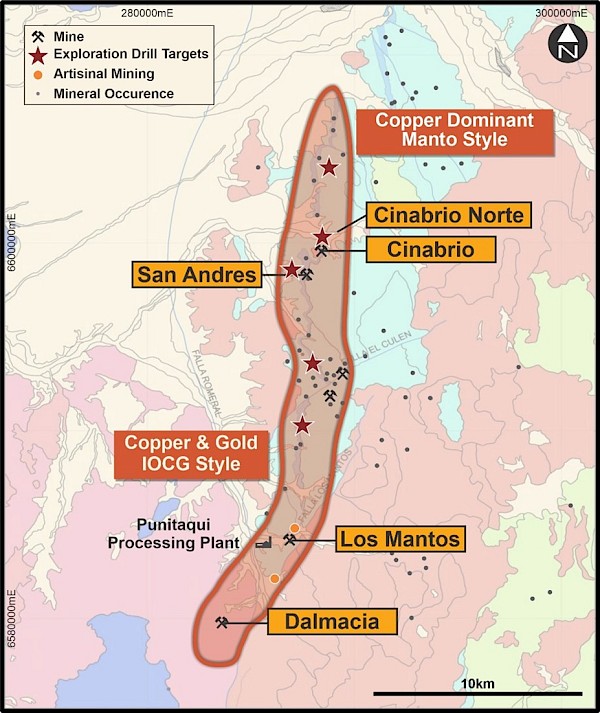
Figure 1: Punitaqui Project Geology and Mineral Occurrence Map
Prior to 1998, only limited extraction of high grade copper oxides was undertaken at San Andres by small groups of local miners. In 2000 a Chilean national company La Empressa Nacional de Mineria (“ENAMI”) developed carried out two underground exploration drives targeting copper sulphides. In 2005, via an option process, San Andres became part of the Punitaqui mine complex.
In 2007, a ground geophysical induced polarization (“IP”) survey was completed on 250m - 500m spaced lines across the San Andres-Cinabrio area. The results of the IP survey line across the southern end of the San Andres zone identified a strong chargeability anomaly interpreted to represent potential extensions of the copper sulphide mineralization at depth and along strike.
At San Andres, historic wide-spaced drilling completed by the previous operators between 2011- 2017 totaled 58 holes for 5,927m (Figure 2 and Table 1).
Table 1: San Andreas Historic Drilling Significant Copper Intercepts
| Drillhole | From (m) |
To (m) |
Interval Length* (m) |
Copper Grade (%) |
|---|---|---|---|---|
| SAS-20-07 | 180 | 196 | 15.9 | 2.52 |
| SA-50 | 128 | 139 | 7.8 | 2.39 |
| SAS-20-01 | 186 | 197 | 10.1 | 2.16 |
| SAS-19-05 | 173 | 189 | 14.3 | 1.85 |
| SAS-20-08 | 183 | 200 | 15.2 | 1.74 |
| SAS-17-04A | 209 | 213 | 2.8 | 2.52 |
| SAS-17-05 | 229 | 234 | 3.2 | 1.80 |
| SAS-17-06 | 189 | 197 | 5.9 | 2.30 |
| SAS-17-06 | 216 | 223 | 5.2 | 1.87 |
*Indicates true width

Figure 2: Location Map San Andres Target on Satellite Image
The recently producing Cinabrio copper deposit is interpreted as an Iron Oxide Copper Gold (“IOCG”) type manto deposit. The known mineralization has a strike length of about 750 meters and the mineralisation is between 10 - 30 meters thick. The mineralized horizon thickness is very continuous up to a depth of around 700 meters. Chalcopyrite and minor bornite and pyrite comprise the known deposit mineralogy and the mineralized horizon dips steeply to the east and is sometimes fault-displaced.
Immediately to the southwest of the Cinabrio deposit is San Andres, which is the faulted offset of the top of the Cinabrio orebody. As currently defined, the mineralized zone at San Andres is approximately 10 meters thick and varies from 5m to 30m (Figure 3).
San Andres is a tabular sedimentary horizon within a volcanic sequence. This sedimentary horizon is variably mineralized and has a variable width ranging from 5m - 30m. It consists of an interlayered volcano-sedimentary sequence composed of dark colored laminated and unlaminated shales, volcanoclastic sandstone, conglomerates and breccias and tuff breccias. There is a variable component of syngenetic pyrite. The horizon dips 40 to 50 degrees to the east and is cut-off at depth by the moderately west dipping San Andres fault.
Mineralization consists of veinlets and irregular disseminations in both the fine and coarse-grained clastic rocks and locally within the volcanic rocks above and below the host unit. The host horizon is also cut and offset by other faults with a wide range of orientations. The principle orientations identified to date include:
- moderately west dipping splays of the San Andres fault generally with down to the west movement
- steep dipping northeast to northwest trending faults with both sinistral and dextral offsets
- Faults parallel and sub-parallel to stratigraphy

Figure 3: Interpretive Cross Section – North San Andres to Cinabrio (Skarmeta 2019)
The intersection of the San Andres fault and the host sedimentary unit plunges toward the south. Because of this the potential volume of ore within the host sedimentary horizon increases towards the south.
The host sedimentary unit at San Andres is in a north-northwest trending ridge. The surface trace of the mineralized unit crosses from the east side of the ridge in the northern part of San Andres to the western side of the ridge in the southern part. The east dipping host unit is dipping at a shallow angle into the topography in the north and at a very steep angle into the topography in the south. For this reason, the depth of oxidation of the mineralization is expected to decrease significantly in the south.
The current 6,000m resource expansion program will focus on San Andres, which is the “normal” fault-displaced upper portion of the adjacent high grade Cinabrio mine. Cinabrio was last in production by Xiana Mining as recently as April 2020 and previous to that was mined by Glencore for approximately 8 years. The San Andres target has established underground ramp access.
Historic drilling at San Andres has identified copper mineralisation over about an 800m strike based on 100m spaced drill sections. The zone extends from surface with potential at depth and along strike in both directions (Figure 4 and Figure 5).
Currently two diamond core drill rigs are operating at San Andres with a third rig expected in early August. The San Andres drill program is designed to infill previous drilling and further the resource extensional drilling to the north and the south (Photo 1 and Photo 2). The current phase of planned drilling comprises 6,000m in 31 drillholes.
Battery CEO Martin Kostuik states; “We are pleased announce that our San Andres infill drilling program is now underway with two drills running and a third drill soon to be added. Organizing and commencing a drill program so soon after the close of the Punitaqui acquisition is an impressive achievement. San Andres was an obvious target to launch our program as it is located just 500m southwest of the Cinabrio copper mine and has established underground ramp access. Earlier wide-spaced historic drilling has identified an 800m long zone that is open at depth and in both directions along strike. We believe this resource drilling program has the potential to provide the Company with a second source of copper ore along with existing ore remaining in Cinabrio. The results of the program will be the catalyst for a new Technical Report that will be our road map to near-term copper production at Punitaqui.”
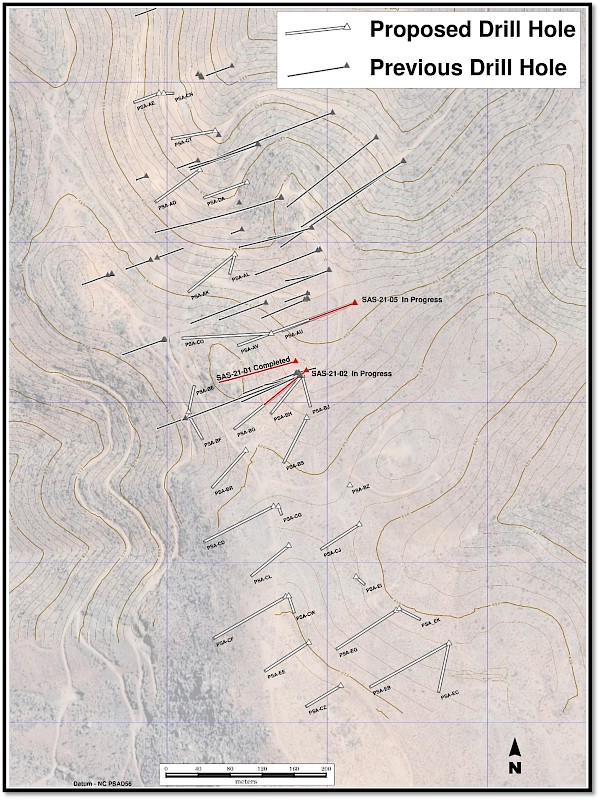
Figure 4: 2021 Drill Collar Location with Historic Drilling
Background
The Punitaqui mining district is located approximately 35 km South of Ovalle in Region IV of Chile.
Punitaqui was discovered in 1780 and was exploited by and for the Spanish government. Historical records of Punitaqui total production and activity are poor. Cinabrio, has been worked periodically since 1968, focussed on exploitation of copper oxides.
In 1965, a geophysical study of induced polarization was conducted and subsequently 141m meters of diamond drilling completed.
Between the months of July and November 1972, 19 diamond drillholes were completed, totaling 630m followed by development of the main access to level 410.
In 2004 the property was acquired by CMC which applied for an exploitation permit based on a sublevel stoping mining plan.
Between 2007 and 2010 Tamaya Resources Limited completed exploration and feasibility work completed focussed on exploiting oxide copper resources.
In 2010 Glencore International Plc acquired the project and developed the Cinabrio deposit.
In 22 May 2018, Xiana Mining Inc. acquired the property and commenced operations.
In March 2021 Battery Mineral Resources Corp entered into an agreement to acquire Minera Altos de Punitaqui Limitada.
The Punitaqui mining project contains 11,838 hectares of concessions. Of these 6,900 hectares of these concessions are exploration concessions and 4,938 hectares are exploitation concessions. The mine property totals 1,138 mining claims and 4 mining leases.
BMR’s holding include three areas which have established underground access including the Cinabrio, San Andres and Dalmacia.
Punitaqui is a past producing mining operation which consists of an integrated copper-gold mining complex. The site is fully permitted and includes a centralized process plant which was fed by the Cinabrio mine and satellite, underground zones at San Andres and Dalmacia.
The process plant consists of a standard copper sulphide crush-grind-flotation circuit to produce a marketable copper-gold concentrate for domestic and foreign smelters. The plant historically operated at a permitted capacity of 3,000 tonnes per day (“tpd”) with allowances to 3,600tpd, with a potential capacity of 4,000tpd to be investigated.
The Punitaqui project is situated within a 25km long mineralized district that is a classic IOCG and mantos style copper belt that is comprised of mantos and structural controlled copper-gold-silver veins.
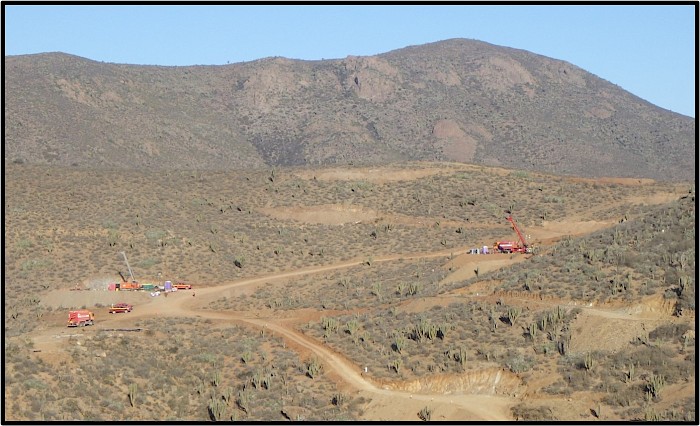
Photo 2: Drill Rigs at San Andres July 2021
Quality Control
Sample preparation, analysis and security procedures applied on the BMR exploration projects is aligned with industry best practice. BMR has implemented protocols and procedures to insure high quality collection and management of samples resulting in reliable exploration assay data. BMR has implemented formal analytical quality control monitoring for all field sampling and drilling programs by inserting blanks and certified reference materials into every sample sequence dispatched.
Sample preparation is performed ALS Global (“ALS”) - geochemistry analytical lab in La Serana, Chile and sample analyses by ALS in Lima, Peru. ALS analytical facilities are commercial laboratories and are independent from BMR. All BMR samples are collected and packaged by BMR staff and delivered upon receipt at the ALS Laboratory in Chile. Samples are logged in a sophisticated laboratory information management system for sample tracking, scheduling, quality control, and electronic reporting. Samples are dried then crushed to 70% < -2 millimeters and a riffle split of 250 grams is then pulverized to 85% of the material achieving a size of <75 microns. These prepared samples are then analyzed by the following methods:
- ME-MS61: A high precision, multi-acid digest including Hydrofluoric, Nitric, Perchloric and Hydrochloric acids. Analysed by inductively coupled plasma (“ICP”) mass spectrometry that produces results for 48 elements.
- ME-OG62: Aqua-Regia digest: Analysed by ICP-AES (Atomic Emission Spectrometry) or sometimes called optical emission spectrometry (ICP-OES) for high levels of Co, Cu, Ni and Ag.
Certified standards are inserted into sample batches by ALS. Blanks and duplicates are inserted within each analytical run. The blank is inserted at the beginning, certified standards are inserted at random intervals, and duplicates are analysed at the end of the batch.
Additional Information
Michael Schuler, Battery Mineral Resources Corp. Chile Exploration Manager, supervised the preparation of and approved the scientific and technical information in this press release pertaining to the Punitaqui Exploration Drill Program. Mr. Schuler is a qualified person as defined by National Instrument 43-101 - Standards of Disclosure for Mineral Projects.
About Battery Mineral Resources Corp.
Battery is a multi-commodity resource company which provides investors with exposure to the world-wide trend towards electrification. Battery is engaged in the discovery, acquisition, and development of battery metals (cobalt, lithium, graphite, nickel & copper), in North and South America and South Korea with the intention of becoming a premier and sustainable supplier of battery minerals to the electrification marketplace. Battery is the largest mineral claim holder in the historic Gowganda Cobalt-Silver Camp, Canada and continues to pursue a focused program to build on the recently announced, +1 million pound cobalt resource at McAra by testing over 50 high-grade primary cobalt silver-nickel-copper targets. In addition, Battery owns 100% of ESI Energy Services, Inc., a pipeline equipment rental and sales company with operations in Leduc, Alberta and Phoenix, Arizona. Finally, Battery is currently developing the Punitaqui Mining Complex, and pursuing the potential near term resumption of operations at the prior producing Punitaqui copper-gold mine. The Punitaqui copper-gold mine most recently produced approximately 21,000 tonnes of copper concentrate in 2019 and is located in the Coquimbo region of Chile.
For further information, please contact:
Battery Mineral Resources Corp.
Martin Kostuik
Phone: +1 (604) 229 3830
Email: info@bmrcorp.com
The securities offered pursuant to the Private Placement have not been, and will not be, registered under the U.S. Securities Act of 1933, as amended (the "U.S. Securities Act") or any U.S. state securities laws, and may not be offered or sold in the United States or to, or for the account or benefit of, United States persons absent registration or any applicable exemption from the registration requirements of the U.S. Securities Act and applicable U.S. state securities laws. This news release shall not constitute an offer to sell or the solicitation of an offer to buy securities in the United States, nor shall there be any sale of these securities in any jurisdiction in which such offer, solicitation or sale would be unlawful.
Neither the TSXV nor its Regulation Services Provider (as that term is defined in the policies of the TSXV) accepts responsibility for the adequacy or accuracy of this press release.
Forward Looking Statements
This news release includes certain “forward-looking statements” under applicable Canadian securities legislation. There can be no assurance that such statements will prove to be accurate, and actual results and future events could differ materially from those anticipated in such statements. Forward-looking statements reflect the beliefs, opinions and projections of the Company on the date the statements are made and are based upon a number of assumptions and estimates that, while considered reasonable by the Company, are inherently subject to significant business, economic, competitive, political and social uncertainties and contingencies. Many factors, both known and unknown, could cause actual results, performance, or achievements to be materially different from the results, performance or achievements that are or may be expressed or implied by such forward-looking statements and the parties have made assumptions and estimates based on or related to many of these factors. Such factors include, without limitation, the ability of the Company to obtain sufficient financing to complete exploration and development activities, risks related to share price and market conditions, the inherent risks involved in the mining, exploration and development of mineral properties, government regulation and fluctuating metal prices. Accordingly, readers should not place undue reliance on forward-looking statements. Battery undertakes no obligation to update publicly or otherwise revise any forward-looking statements contained herein whether as a result of new information or future events or otherwise, except as may be required by law.
